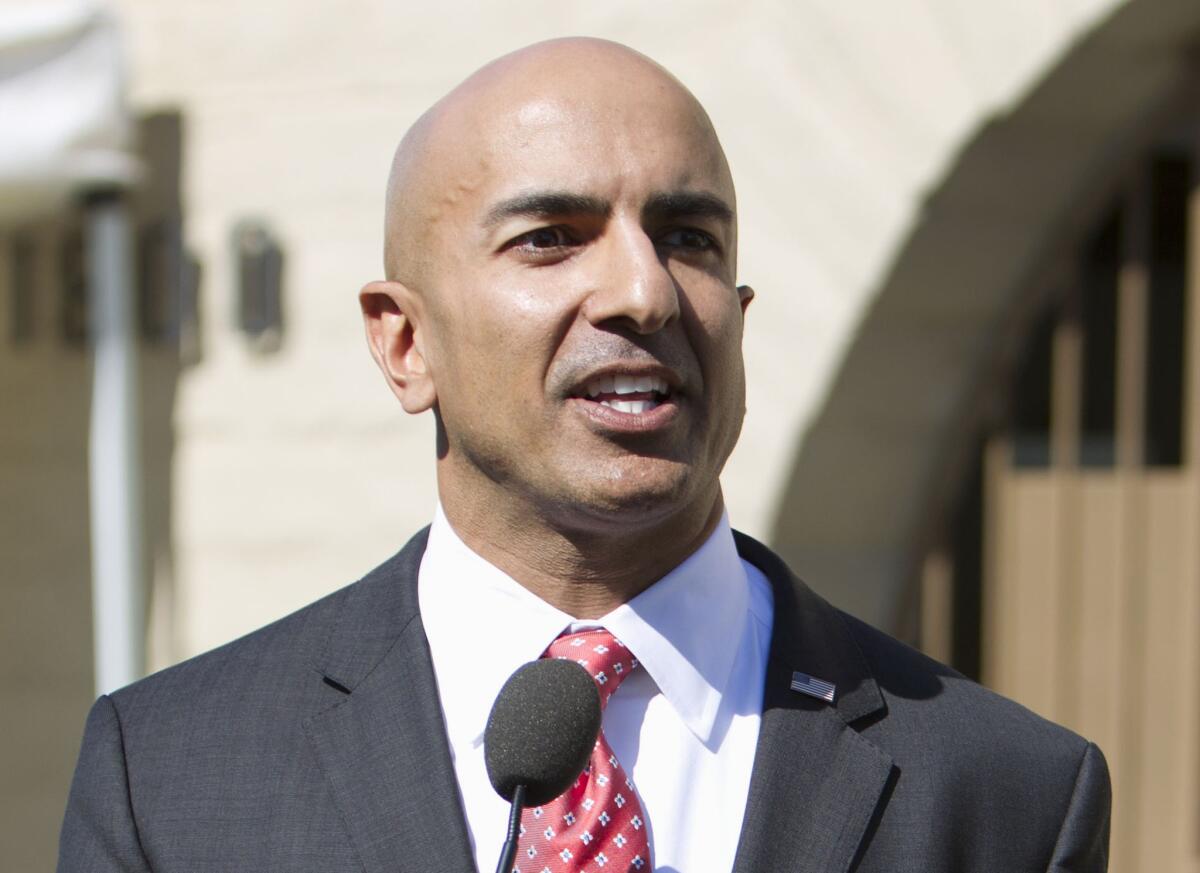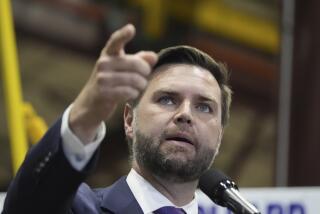Break up big banks, suggests the Fed’s Neel Kashkari, who ran 2008 bailout fund

Neel Kashkari, now the president of the Federal Reserve Bank of Minneapolis, speaks in Sacramento on July 21, 2014, during his campaign for California governor.
- Share via
Reporting from Washington — A top Federal Reserve official who administered the 2008 bank bailout fund suggested Tuesday that Congress consider breaking up the largest financial firms or treating them like public utilities to prevent their failures.
Neel Kashkari, the former Treasury official who was the 2014 Republican nominee for California governor, announced that he was launching an initiative in his new role as president of the Federal Reserve Bank of Minneapolis to develop tougher regulations to solve the problem of banks considered too big to fail.
While the 2010 Dodd-Frank financial reform law has made “significant progress” in strengthening the financial system, it did not go far enough, he said.
See more of our top stories on Facebook >>
“I believe the biggest banks are still too big to fail and continue to pose a significant, ongoing risk to our economy,” Kashkari said in a speech to the Brookings Institution think tank.
“Now is the right time for Congress to consider going further than Dodd-Frank with bold, transformational solutions to solve this problem once and for all,” he said.
Among the options that should be given “serious consideration” are “breaking up large banks into smaller, less connected, less important entities” and “turning large banks into public utilities by forcing them to hold so much capital that they virtually can’t fail,” he said.
“The financial sector has lobbied hard to preserve its current structure and thrown up endless objections to fundamental change,” said Kashkari, who is a former executive at Goldman Sachs Inc.
“And in the immediate aftermath of the crisis, when the Dodd-Frank Act was passed, the economic outlook was perhaps too uncertain to take truly bold action,” he said. “But the economy is stronger now, and the time has come to move past parochial interests and solve this problem. The risks of not doing so are just too great.”
The high-profile initiative is unusual for a regional Fed president, particularly one who just took office Jan. 1. But Kashkari has more government and political background experience than the typical holder of such a position.
He was a senior advisor to Bush administration Treasury Secretary Henry M. Paulson when the financial system was on the brink of meltdown in the fall of 2008. Paulson tapped Kashkari to run the $700-billion bank bailout initiative known as the Troubled Asset Relief Program.
See the most-read stories this hour >>
Kashkari continued in that role for the first few months of the Obama administration. He received mixed reviews for his performance as the first head of TARP, which ended up turning a modest profit for the federal government.
He received bipartisan praise for conceiving, setting up and administering the bailout fund during its most significant period. But watchdog agencies complained Kashkari was overly secretive and deferential to the big banks.
In his speech Tuesday, Kashkari took on the big banks in a way surprising for a former Goldman Sachs executive who was a Republican politician.
“There are lines in your speech that I can imagine Bernie Sanders or Elizabeth Warren saying,” David Wessel, director of Brookings’ Hutchins Center on Fiscal and Monetary Policy, told Kashkari during a panel discussion after the speech.
Sanders, who is running for the Democratic presidential nomination, and Warren, a liberal Democratic senator from Massachusetts, have railed against Wall Street.
They have called for legislation to reinstate the Depression-era Glass-Steagall law, which separated federally insured deposit-taking from risky investment banking.
SIGN UP for the free California Inc. business newsletter >>
Kashkari did not mention Glass-Steagall and stressed that he was not calling for specific actions but launching an effort to study how to better address the risks posed by the nation’s largest banks.
The Minneapolis Fed will host a series of symposiums beginning this spring and “will consider the likely benefits, costs, risks and implementation challenges” of various options, he said.
The events will be streamed over the Internet and will include a website to solicit input from the public.
Follow @JimPuzzanghera on Twitter
ALSO
Airlines raise fares for the second time this year
PETA rakes in more donations as it denounces SeaWorld
Southern California home sales increase in January compared with a year earlier
More to Read
Inside the business of entertainment
The Wide Shot brings you news, analysis and insights on everything from streaming wars to production — and what it all means for the future.
You may occasionally receive promotional content from the Los Angeles Times.











